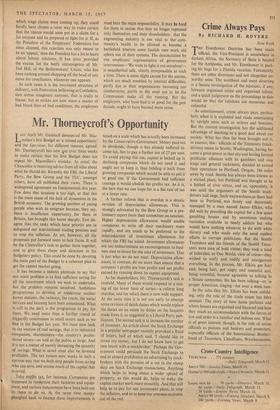Mr. Thorneycroft's Opportunity
T AST April Mr. Gaitskell denounced Mr. Mac- millan's first Budget as 'a missed opportunity' ' and the Spectatoe, for different reasons, agreed. Mr. Thorneycroft has now jitst over three weeks to make certain that his first Budget does not repeat Mr. Macmillan's mistake. As usual, the Chancellor is receiving advice from all sides about what he should do. Recently the FBI, the Liberal Party, the Bow Group and the TUC, amongst others, have all published their views. There is widespread agreement on fundamentals this year. Few deny that taxation is too high, or that this is the main cause of the lack of dynamism in the British economy. The growing number of young people who wish to emigrate because, they say, there is insufficient opportunity for them in Britain, has brought this home sharply. Few dis- agree that the tasks which have priority are to safeguard our international trading position and to stop the inflation. As yet, however, all the proposals put forward seem to lack focus. It will be the Chancellor's task to gather them together, and to give them shape and direction in his budgetary policy. This could be done by devoting the main part of the Budget to a coherent plan to get the capital market going.
It has become a tedious platitude to say that our main problem is to find sufficient saving for all the investment which we wish to undertake, but the problem remains unsolved. Ambitious programmes to develop or m6dernise nuclear power stations, the railways, the roads, the social services and housing have been announced. What is still in the dark is the programme to pay for them. We need more than a further round of niggardly concessions to small savers such as we had in the Budget last year. We must now look to the sources of real savings, that is to industrial companies, shareholders—the country's profes- sional savers—as well as the public at large. And it is not a matter of merely increasing the quantity of savings. What is saved must also be invested profitably. The tax system now works in such a curious way that we both stop people from,saving who can save, and misuse much of the capital that is.saved.
• Takc,prpfits tax, for instance. Companies are supposed to modernise their factories and equip- ,ment, and various inducements have been held out to them to do so. At the same time money ploughed back to finance these improvements is taxed on a scale which has actually been increased by the Conservative Government. Money paid out in dividends, though it has already suffered in- come tax, has to pay a further tax of 27 per cent. To avoid paying this tax, capital is locked up in declining companies Which do not need it and ought not to keep it, thus holding it back from growing companies which would be able to put it to good use. If the Government had sufficient courage it would abolish the profits tax. As it is, the best that we can hope for is a flat rate of tax at a lower rate.
A further reform that is overdue is a drastic revision of depreciation allowances. This is strongly advocated by the Bow Group in a pre- liminary report from their committee on taxation. Higher depreciation allowances would enable companies to write off their machinery more rapidly, and are much to be preferred to the reintroduction of investment allowances for which the FBI has asked. Investment allowances are too indiscriminate an encouragement to busi- ness men to invest for the sake of investment. That is just what we do not want. Depreciation allow- ances, in contrast, do no more than ensure that a company's profits are true profits and not profits earned by running down its capital equipment.
As for shareholders, Mr. Thorneycroft's task is twofold. Many of them would respond to a rais- ing of the lower limit of surtax—a reform long overdue, and for which there is now wide support. At the same time it is not too early to attempt some revision of death duties which would replace the duties on an estate by duties on the bequests made from it, as suggested in a Liberal Party pub- lication. The second task is to increase the number of investors. An article about the Stock Exchange in a popular newspaper recently provoked a flood of letters, half of which said, 'I should like to invest my money, but I do not know how to get into touch with a stockbroker.' Perhaps the Gov- ernment could persuade the Stock Exchange to end its absurd prohibition on advertising by stock- brokers with the promise of a cut in the stamp duty on Stock Exchange transactions. Anything which helps to bring about a wider spread of property, as this would do, helps to make the capital market work more smoothly. And that will help us to pay for our investment plans, to stop the inflation, and so to keep our overseas accounts out of the red.


































 Previous page
Previous page